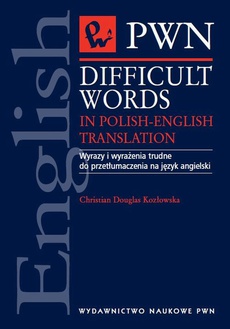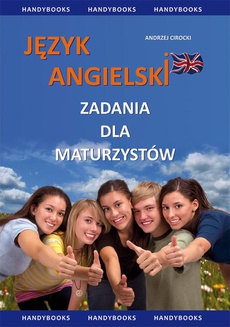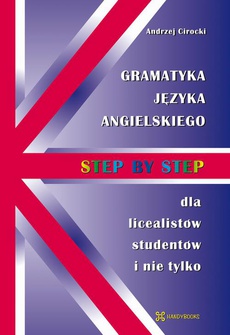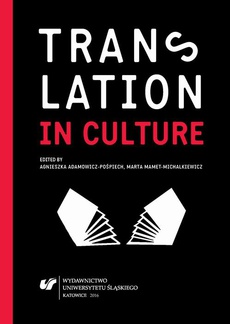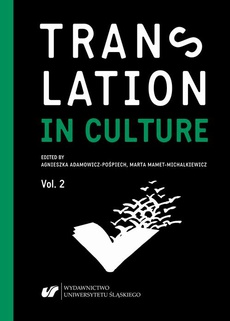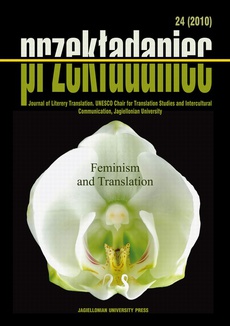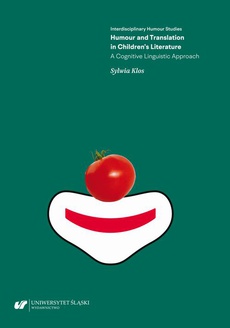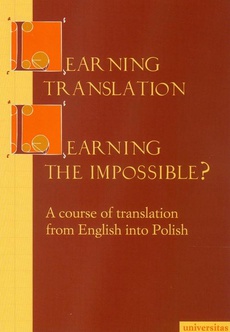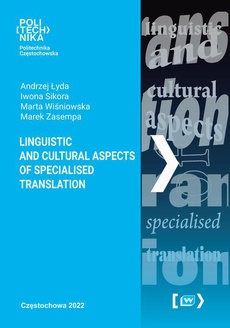POLECAMY
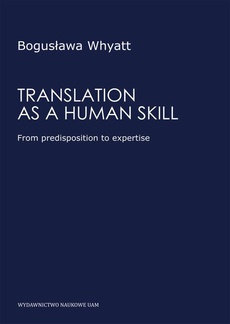
Translation as a human skill. From predisposition to expertise
Autor:
Format:
ibuk
Książka podejmuje tematykę przekładu jako umiejętności człowieka w perspektywie rozwojowej od predyspozycji po kompetencje eksperta. Zakładając, że umysł ludzki z natury jest umysłem przekładającym sens, wszyscy znający dwa języki są w stanie tłumaczyć, ale tylko niektórzy rozwijają tą zdolność w bardziej złożoną umiejętność, jeszcze mniej osób zdobywa zawodowe kompetencje, a już nieliczni stają się ekspertami. Rozpoczynając od dokładnej analizy podstaw jakie daje znajomość dwóch języków, autorka dokonuje przeglądu wiedzy dotyczącej tłumaczenia jako zdolności naturalnej i umiejętności wyuczonej, czego rezultatem jest wysunięcie hipotezy, iż rozwój kompetencji tłumaczeniowych można postrzegać jako proces integracji wiedzy. Naturalni tłumacze integrują tylko wiedzę językową podczas gdy tłumacze zawodowi integrują wszystkie przydatne struktury wiedzy. Założenia teoretyczne poddane są badaniom empirycznym za pomocą baterii ankiet i programu komputerowego „Translog”, który pozwala na analizę procesu tłumaczenia bez ingerencji w naturalne środowisko pracy tłumacza. Konkluzje i praktyczne przesłanki w intencji autorki przyczynią się do wzrostu świadomości rozwojowej natury tłumaczenia jako umiejętności człowieka i tym samym podważą powszechne mylne poglądy.
| Rok wydania | 2012 |
|---|---|
| Liczba stron | 448 |
| Kategoria | Język angielski |
| Wydawca | Wydawnictwo Naukowe Uniwersytetu im. Adama Mickiewicza |
| Seria | 978-83-232-2504-1 |
| ISBN-13 | 978-83-232-2504-1 |
| Numer wydania | 1 |
| Język publikacji | polski |
| Informacja o sprzedawcy | ePWN sp. z o.o. |
Ciekawe propozycje
Spis treści
| Acknowledgements | 9 |
| Introduction | 11 |
| Chapter 1: Establishing common grounds | 17 |
| 1.1. Human translating mind | 17 |
| 1.2. Translation as a widespread phenomenon | 20 |
| 1.3. Translation proper – essential distinctions | 22 |
| 1.4. Translation as a human skill – common misconceptions | 24 |
| 1.5. Translation as a predisposition, ability, skill, competence and expertise | 25 |
| 1.6. The translator | 30 |
| 1.6.1. Need for a developmental perspective | 31 |
| 1.6.2. The role of translators | 34 |
| 1.7. The scope of systematic research in translation expertise development | 37 |
| 1.7.1. Linguistics | 37 |
| 1.7.2. Translation Studies | 40 |
| 1.7.3. Psycholinguistics and cognitive psychology | 43 |
| 1.8. Conclusions | 47 |
| Chapter 2: Bilingual foundations of translation ability | 49 |
| 2.1. Bilingual foundations and Translation Studies | 49 |
| 2.2. The nature of human language and the knowledge of two (or more) languages | 52 |
| 2.3. A bilingual person | 58 |
| 2.3.1. Natural bilinguals and translation ability | 60 |
| 2.3.2. Bilingual competence of L2 learners as potential translators | 63 |
| 2.4. The interaction of two languages in one mind – an L2 learner’s perspective | 67 |
| 2.4.1. Cross-linguistic interference | 68 |
| 2.4.2. Three perspectives on bilingual coexistence in a single mind | 69 |
| 2.5. The notion of language control | 74 |
| 2.6. Bilingual memory | 82 |
| 2.6.1. The hierarchical structure of the bilingual lexicon | 83 |
| 2.6.2. The revised hierarchical model (RHM) | 87 |
| 2.6.3. Deficiencies and limitations of the RHM | 88 |
| 2.6.4. Bilingual memory and translation | 93 |
| 2.7. Cognitive effects of bilingualism | 98 |
| 2.8. Conclusions | 102 |
| Chapter 3: Translation as an untrained ability | 107 |
| 3.1. Dispute over bilingual knowledge and translation capacity | 107 |
| 3.2. Translation as a natural ability of bilinguals | 109 |
| 3.2.1. Studies in natural translation | 110 |
| 3.2.2. Natural translators are translators | 116 |
| 3.3. L2 learners as natural translators | 119 |
| 3.3.1. Translation as the fifth skill of L2 learners | 120 |
| 3.3.2. Studies in L2 translation | 126 |
| 3.4. Developmental shift in translation as a bilingual ability of L2 learners – TAP studies | 130 |
| 3.4.1. Intercultural competence | 133 |
| 3.4.2. Metalinguistic awareness | 139 |
| 3.4.3. Re-organization of the bilingual memory | 144 |
| 3.5. Conclusions | 148 |
| Chapter 4: Developing translation competence | 153 |
| 4.1. Translation competence | 153 |
| 4.1.1. The additive perspective on TC | 154 |
| 4.1.2. The componential perspective on TC | 157 |
| 4.1.3. The holistic perspective on TC | 163 |
| 4.2. Acquiring translation competence | 167 |
| 4.2.1. Some suggestions on how TC can be acquired | 167 |
| 4.2.2. The correlation between TC and translation experience | 172 |
| 4.3. TC acquisition and the “pedagogical gap” | 177 |
| 4.3.1. Focus on the translation process | 177 |
| 4.3.2. Learner-centred approaches to translation training | 181 |
| 4.4. Different routes to translation competence | 185 |
| 4.5. The professional self and translation as a profession | 188 |
| 4.6. Conclusions | 195 |
| Chapter 5: Becoming a professional translator: A proposal of a Knowledge Integration Network in the development of translation as a professional skill | 199 |
| 5.1. Creativity in translation | 200 |
| 5.2. Theoretical foundations of KIN | 204 |
| 5.2.1. The human mind as a synchronized system | 208 |
| 5.2.2. Limited capacity of the human mind | 210 |
| 5.2.3. Meta-cognitive supervision and goal orientedness | 213 |
| 5.3. Developmental nature of the ability to integrate knowledge | 217 |
| 5.3.1. Approaching the SL text | 218 |
| 5.3.2. Approaching meaning | 222 |
| 5.3.3. Approaching external resources to aid translation | 223 |
| 5.3.4. Approaching the translation process: self-monitoring and meta-cognitive supervision | 228 |
| 5.3.5. Approaching revision | 232 |
| 5.4. The translator as an expert learner | 237 |
| 5.4.1. The translator as a Systems Intelligent person | 238 |
| 5.4.2. The translator as a self-confident expert | 243 |
| 5.5. Undervalued affective factors in TC acquisition | 248 |
| 5.6. Conclusions | 251 |
| Chapter 6: Empirical investigation into knowledge integration in translators – a questionnaire study | 257 |
| 6.1. The purpose of the questionnaire study | 257 |
| 6.2. Discussion of the results | 261 |
| 6.2.1. Translation as a profession – assumptions and facts | 262 |
| 6.2.2. Ideas about translation as an activity | 271 |
| 6.2.3. Bilingual foundations of translation as a human skill | 276 |
| 6.2.4. A translating professional at work | 291 |
| 6.2.5. The translator as an individual | 308 |
| 6.3. Conclusions | 321 |
| Chapter 7: Empirical investigation into knowledge integration in the translation process – a Translog study | 327 |
| 7.1. Research method | 327 |
| 7.2. Study 1 – objectives, participants, procedure | 334 |
| 7.3. Study 1 – data analysis | 337 |
| 7.3.1. Duration | 338 |
| 7.3.2. Duration and dictionary use | 342 |
| 7.3.3. Duration and typing speed | 347 |
| 7.3.4. Distribution of the remaining time in the translation process | 353 |
| 7.4. Study 2 – objectives, participants, procedure | 369 |
| 7.5. Study 2 – data analysis | 370 |
| 7.5.1. KIN as a single variable | 371 |
| 7.5.2. Duration and other text production features | 372 |
| 7.6. Conclusions | 379 |
| Conclusions and Implications | 383 |
| References | 391 |
| Appendix I | 425 |
| Appendix II | 429 |
| Appendix III | 439 |
| Przekład jako umiejętność człowieka. Od predyspozycji do poziomu eksperta (Streszczenie) | 445 |


